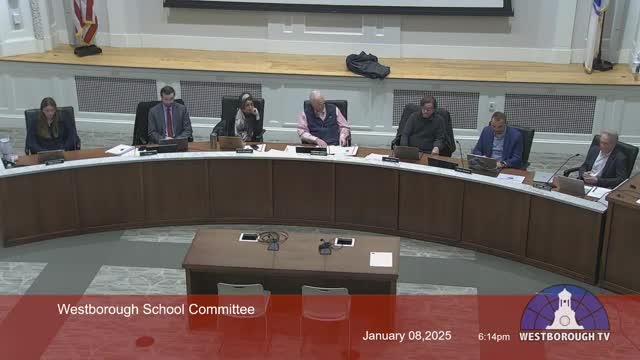Westborough schools plan districtwide AI training and guidelines, target fall 2025 for policy
Get AI-powered insights, summaries, and transcripts
Subscribe
Summary
Superintendent Allison outlined a year-long professional development effort on generative AI for staff and students, led by consultant Greg Kulowick, with district guidelines and policy recommendations expected in fall 2025.
Superintendent Allison told the School Committee the district is running professional development this year to prepare teachers and students for generative artificial intelligence and intends to produce districtwide policy guidance by fall 2025.
The work begins with professional development for teachers in grades 4–12 led by consultant Greg Kulowick and district staff, Allison said. "We want our kids to understand that, to understand, you know, basically, where the future seems to be headed here," Allison said, describing classroom training on ethics, bias, appropriate uses and the limitations of generative models. The district hopes to move from teacher-level practices to formal guidelines this spring and summer and start the 2025–26 school year with targets and expectations in place.
Nut graf: The committee described the effort as both pragmatic and precautionary — a way to help teachers preserve students' ownership of learning while teaching digital literacy. Committee members and commenters urged the administration to prioritize practical classroom guidance, privacy protections and age-appropriate rollout plans.
Allison and staff framed the effort around helping teachers keep the "cognitive load" with students rather than letting tools do the thinking for them. Allison read from a published summary about the arrival of generative AI and said it differs from prior classroom technology because "it is here whether we want it or not," and educators must decide how to integrate it. Daniel (staff member) demonstrated how a single, well-constructed prompt can produce a near-complete lesson plan in under a minute, and stressed prompt quality and student background knowledge as essential to evaluating model output.
Consultant Greg Kulowick described an "AI spectrum of use" that ranks tasks by how much thinking is done by students versus by AI, and the district's PD emphasizes moving students and teachers toward uses that preserve higher-order thinking. Allison said the PD will include discussion of ethics, bias and how to critically evaluate AI output.
Public commenters and committee members raised two recurring concerns: hallucination (models producing plausible but false information) and enforceability of prohibitions. A parent commenter warned that "these language models... will always hallucinate," and urged that teaching students to evaluate AI output require prior subject knowledge. A student speaker told the committee the uniform policy would help avoid inconsistencies between classes.
The administration said there is not yet a districtwide student-use policy; use is currently teacher- and department-level. The plan is to collect examples from other districts, finish staff alignment through March, draft policy recommendations in spring/summer, and implement district expectations in the fall of 2025.
Ending: Committee members agreed to continue the discussion in spring and to provide feedback as the staff drafts policy proposals and publishes PD outcomes.
